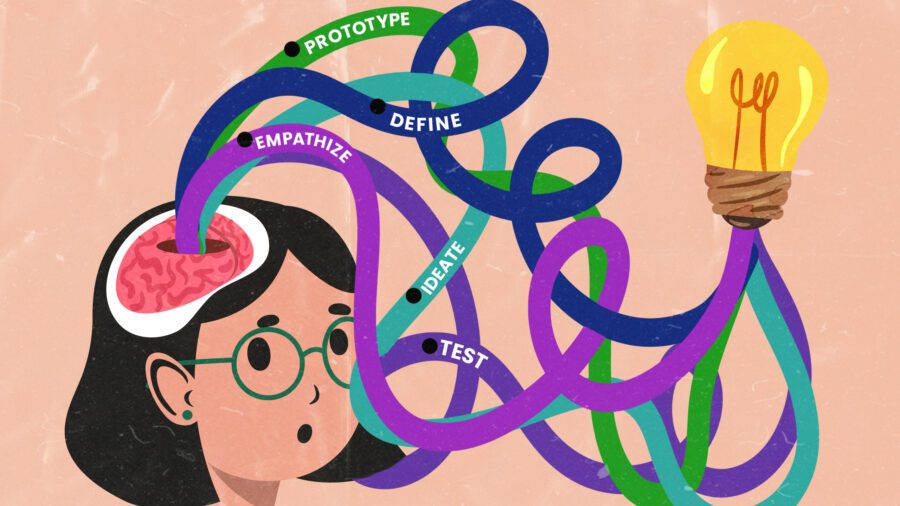
An Extrovert’s Guide to Listening Well, Being Present, and Spending Time Alone
Have you ever noticed that someone isn’t listening to a word you’re saying when you’re in the middle of a conversation with them?
Though unpleasant, this is almost a universal experience for us as people. Sometimes it’s at a party or event when you’re locked in a conversation with a person you don’t know all that well. Other times, it may be during a serious conversation with a partner, and you notice they aren’t actually hearing what you’re saying. Rather, they’re waiting for their turn to speak. This situation is frustrating, to say the least, even if you don’t know the person very well.
No one wants their words to fall on deaf ears.
Any participant in a conversation has two goals: to cognitively understand what the other person is saying to them (both understanding the words as well as the emotion behind them) and to display interest and engagement. The latter isn’t merely for social purposes or to make the speaker feel good. If people fail to feel “heard” when they speak, they will more than likely cease to share information altogether.
Whether you want to understand how to encourage someone in your life to become a better listener or you’re trying to work on it yourself, this article has you covered. As an extrovert, it’s not only important that you pause and actively listen to what others have to say when they speak to you, but it’s equally as important to learn how to spend time on your own in a healthy way.
We also want to say that it isn’t just extroverts who can become better listeners. There are plenty of introverts out there who display the same tendencies we described above, and who can benefit tremendously from the principles we lay out in this article.
Now, let’s get into it!
The Qualities of Active Listening
“Active listening” is a term used to describe exactly what it sounds like — listening actively. There are three crucial aspects to active listening, and they include cognitive, emotional, and behavioral.
Firstly, if someone is actively listening, they must cognitively pay attention to and understand both the explicit and implicit information being conveyed to them. The listener must comprehend and integrate this new information.
Secondly, they must manage any emotional reactions they may have. This means staying compassionate and calm, regardless of the subject matter of the conversation. It also means understanding the emotional implications of what the speaker may be conveying.
Maybe they’re describing their day to you with words that sound pleasant, but their tone and facial expressions indicate they might be feeling sad. Those clues should tell you to focus in on more than the words and see if you can learn anything from their body language.
Lastly, an active listener must engage behaviorally. This means conveying interest and compassion both verbally and nonverbally. Some common examples of behavioral engagement include nodding with encouragement or agreeing with an opinion stated.
Active listening is a skill that often takes many people a lifetime to master.
You cannot simply start nodding and reading people’s emotions and become the world’s best listener. Every person is unique and has their own way of conveying information and feeling. The most important thing you can do starting out is attempt to master these three qualities of active listening and be present.
Why Is Active Listening Important?
Let’s go back to what we talked about at the beginning of the article — distracted listening.
We all know the feeling when the person you’re engaged in conversation with starts to look around at the room, at their phone, or just begins to look exceptionally bored. Admittedly, this is an unpleasant feeling, and it can make the speaker wonder why they’re putting effort into the conversation at all. This is called distracted listening.
Distracted listening isn’t exclusive to face-to-face conversations, either. You can almost always notice when someone is distracted while you’re speaking with them over the phone. Maybe they’re giving short, one-word answers that don’t really suit the conversation, or maybe there’s a consistent delay before they respond to anything you say. Distracted listening is a problem, but given the digital world we live in, it’s not surprising.
We are all constantly being pulled in all directions for our attention — it’s no secret that our tech can be a black hole of distractions.
Who’s calling me, and what do they want? What does this email from work say? If you don’t make an effort to listen up and pay attention, it’s only a matter of time before one of these wins the battle for your attention.
How to Use Meditative Practices to Overcome Distracted Listening
It may help to think of active listening like you would meditation. When you think about it, the two are not all that dissimilar. To effectively listen to someone, you need to clear your mind of all other distractions so you can devote your whole attention to the other person.
Make sure you have your phone silenced and away from you — if sitting at a table, it may help to place your phone face-down so that you won’t even be tempted to glance at it should you receive a notification. If you’re at your desk at work, turn the monitor off and face toward the person speaking. Try to push away those thoughts about approaching deadlines or meeting agendas while listening so that you can comprehend and respond appropriately.
Just because you sometimes get distracted while listening doesn’t mean you’re a bad person. We all have busy lives and a million different things competing for our attention. These practices are intended to improve your focus so that you can devote your whole attention to whoever is speaking. By following these tips, your friends are sure to notice a difference when they’re talking to you.
Active Listening Is a Judgement-Free Zone
If done properly, active listening is really an act of empathy.
The goal of active listening is to see the world from the other person’s point of view and understand the emotions they feel. You’re never going to accomplish this if you are silently judging the actions of the speaker while they talk. You may think they would never be able to tell that you’re judging them, but you will be sending all sorts of subtle nonverbal cues that indicate you have feelings about what they’re saying.
Humans have a complex process of reading each other’s faces and general body language for emotions that has developed over thousands of years of interacting with one another. Even if you think you’re the pinnacle of stoicism, it will probably be noticed when you’re judging someone while they speak to you.
Conversely, approaching a conversation with an open mind and willingness to listen without any sort of judgment will prompt the other person to open up to you and, ultimately, trust you. Trust is the foundation upon which better communication is built and is essential to any constructive conversation.
Join In 200 Million+ On The Journey to Greatness
Display Interest and Engage in the Conversation
It may seem simple, but one of the most effective ways to show someone you are listening and engaged with what they’re saying is to repeat what they just said back to them.
It can feel a little unnatural at first, but multiple studies have shown that this works. Not only does it give the conversation a moment of pause to recover from any emotional reaction that might have occurred, but it makes the speaker feel like you’re listening and keeps you on track as the conversation moves along.
It’s important to note that rephrasing what someone just said has somewhat of the opposite effect that repeating word for word has. If you need to rephrase something in your own words, say something along the lines of, “Let me repeat this back in my own words to make sure I fully understand.” This will ensure they don’t feel like you’re trying to steamroll them by rephrasing everything they say.
Nonverbal Cues
One of the easiest ways to make sure the person speaking feels like you’re listening to them is to offer nonverbal cues. Examples include maintaining eye contact, posture, and nodding in affirmation. It’s important to offer nonverbal cues during a conversation, but it can be a lot to keep in mind if those things don’t come naturally to you.
If it would take too much of your focus away from the conversation to make sure you’re nodding and keeping eye contact, that’s okay!
You can instead let the other person know you’re not a very reactive person before the conversation begins and to bear with you if it seems like you’re not paying attention. This will allow them to feel heard as they speak, even if you’re not offering the typical nonverbal cues they may be used to.
Make Learning Your Conversational Goal
What if you thought of active listening as a free opportunity to learn? When engaging with anyone in a conversation, try to see it as a way for you to learn something new.
After all, everyone has lived their own lives and picked up valuable knowledge along the way. Surely there will be a useful nugget of information you can obtain from the conversation! All you have to do is ask constructive questions.
Another way to think of this is as if you were the host of your very own podcast. You’ve got to engage your guest and ask questions that will engage them while also making them feel comfortable enough to open up to you. Some examples of questions to throw out might include:
- What surprised you about that?
- What did you learn from that experience?
- What about that piqued your interest?
- What did you enjoy most about that?
No one’s going to listen to a podcast of a one-way conversation, so keep those questions coming! However, it’s important not to plan ahead what questions you’re going to ask so that the speaker doesn’t feel like you’re just reading off a script. Make sure the questions pertain specifically to the topic you’ve been discussing.
How to Spend Time Alone as an Extrovert
To some, alone time is cherished and sought after.
In the rat race of our busy everyday lives, many people look forward to sitting alone at home or in a cafe. It’s an opportunity to read, journal, unwind, or just mull over your own thoughts without any distractions around you. Some hardcore introverts may even prefer being alone to going out with other people, and that’s okay! Everyone should have the right to feel comfortable and spend their time in whatever way suits them best.
Everyone doesn’t feel the same way though. Spending time alone may be much more difficult for people who simply enjoy others’ company more than their own. Sometimes, an individual may even be anxious or afraid of being alone with their own thoughts.
If you’re an extrovert who has trouble spending time alone, consider the following few ideas as ways to get more comfortable without the stimulation of other people around.
Go See a Movie
Contrary to popular belief, you don’t need a partner to go to the movie theater. One of the most rewarding things to do alone is to go see a movie. Society has portrayed movie theaters as something only couples visit, and it can leave many feeling alienated.
But think about flying solo at a movie this way — you don’t need to agree with anyone on which movie to see, you don’t need to pay for extra popcorn, and you don’t have to worry if they’re having a good time or not. All you have to do is sit back and enjoy the cinema.
Take a Walk
A simple stroll around your local park or neighborhood is a fantastic way to not only relax and appreciate nature but also to collect your thoughts and relish in your own company. Put in some headphones and listen to your favorite album, or just listen to the natural sounds from wildlife while you walk.
Empathy, Solitude, and Becoming a Better Listener
Listening, much like empathy, is a skill that is significantly undertaught today.
Many people grow up without any real guidance on what it takes to effectively listen to another person, and they may not even know it. We have shaped the world to distract us from every angle at all times, so it takes an intentional effort to break away from these distractions and devote your entire attention to someone speaking.
With practice and dedication, anyone can be a great listener. Even the most flamboyant of extroverts can learn to quiet themselves and listen and understand what someone else is saying to them.
Here’s to finding greatness on your listening journey!
Greatness Authors
Greatness Authors is a collection of writers, thinkers, curiosity experts, and students of the world who are committed to bringing you the most up-to-date, impactful, and inspiring information surrounding Greatness topics.

Redefining Poetry: How Instagram Sensation Rupi Kaur Showed That Poetry Is for Everyone

The Young Professional’s Guide to Advocating for Yourself at Work & Setting Healthy Boundaries

Olympian Yusra Mardini’s Incredible Story of Resilience, Rescue, and Refugee Rights

A Beginner’s Guide to Effortlessly Attracting Money and Growth Opportunities

Psychologist Edith Eger’s Inspirational Journey to Find Forgiveness and What It Means for You










